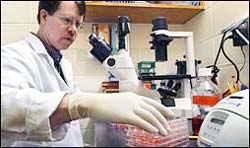International consultation aims to minimize impact of zoonoses

Animal disease researchers are increasingly needed in the fight against emerging infectious diseases. Photo: AP
The World Health Organization (WHO) is hosting a three-day consultation to identify the factors that allow diseases to jump from animals to humans (zoonoses), as well as to improve surveillance systems for their monitoring and control. The consultation, held jointly with the Food and Agriculture Organization (FAO) and the Office International des Epizooties (OIE), in collaboration with the Dutch Health Council, will take place at WHO’s Geneva Headquarters, from 3-5 May.
The transmission of a disease such as SARS or avian influenza from animals to humans depends on numerous factors, including complex interactions between human and animal hosts, the causative microbial agent, and the environment. Ecological changes resulting from human activities represent by far the most important factor in the emergence of any zoonotic disease.
International experts on public health, veterinary science, microbiology, ecology, conservation biology, disease modelling and forecasting will consider what lessons can be learned from the numerous outbreaks of zoonoses including the recent SARS and avian influenza outbreaks. Other illnesses, such as “mad cow” disease, its human form, variant Creutzfeldt-Jakob disease, and Nipah virus infections, will also be analyzed to determine what measures might prove effective in preventing the emergence of similar diseases in the future.
The meeting will consider current challenges in predicting the emergence of the next disease capable of breaching the species barrier. WHO and its partners will consider specific surveillance and monitoring systems for zoonotic diseases. Methods to avert their occurrence or minimize their impact on human and animal health, as well as on national economies, will be discussed.
Because zoonoses are diseases that affect animals and have the potential to infect humans, many of the measures essential to reducing the risk to human health must be taken by sectors beyond public health, such as agricultural or environmental authorities.
“WHO seeks to protect global public health,” says Dr François Meslin, WHO Coordinator for Zoonoses Control. “As recent outbreaks have demonstrated, inter-sectoral and inter-disciplinary cooperation is crucial to ensuring that international public health is not compromised.”
For WHO and its partners, the consultation aims to provide guidance in strengthening capacity of countries and that of the international community to collect and share information across many sectors. “Identifying the next zoonotic disease of international public health importance will not be easy,” says Dr Meslin, “We hope that the consultation will provide new tools that may make this possible in the near future.”
Media Contact
More Information:
http://www.who.intAll latest news from the category: Health and Medicine
This subject area encompasses research and studies in the field of human medicine.
Among the wide-ranging list of topics covered here are anesthesiology, anatomy, surgery, human genetics, hygiene and environmental medicine, internal medicine, neurology, pharmacology, physiology, urology and dental medicine.
Newest articles

Trotting robots reveal emergence of animal gait transitions
A four-legged robot trained with machine learning by EPFL researchers has learned to avoid falls by spontaneously switching between walking, trotting, and pronking – a milestone for roboticists as well…

Innovation promises to prevent power pole-top fires
Engineers in Australia have found a new way to make power-pole insulators resistant to fire and electrical sparking, promising to prevent dangerous pole-top fires and reduce blackouts. Pole-top fires pose…

Possible alternative to antibiotics produced by bacteria
Antibacterial substance from staphylococci discovered with new mechanism of action against natural competitors. Many bacteria produce substances to gain an advantage over competitors in their highly competitive natural environment. Researchers…





















